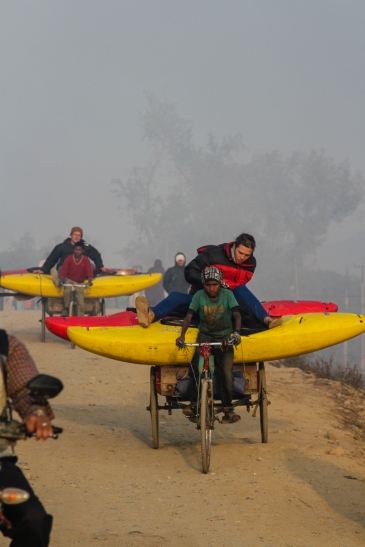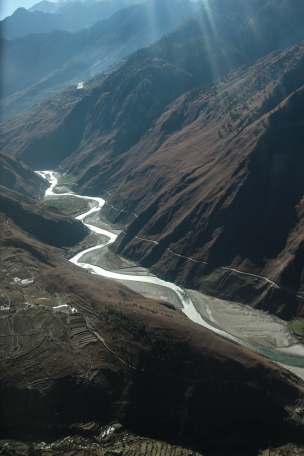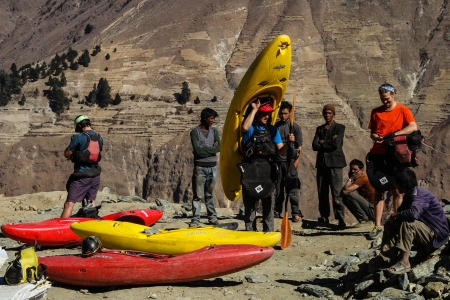As always, it was the little things that slowed us down. The finding of lentils, rice, a small cook-pot, a spare pair of socks, charging batteries, and printing what few maps we could find. The objective was the Thuli Bheri. At its confluence with the Sani Bheri, the two rivers created the largest tributary to the Karnali River and as a result drained the entirety of the Dolpa region including the Dualaghiri range. Through what little description could be found, the four of us; Adam, his brother Jeff, Joe, and I had concluded that the trip would require at least 5 and at most 7 days on the water, three days of travel and trekking to get to the put-in, and two days travel to get back to Pokhara. Just enough time before we all parted ways for various ends of the earth for the next legs of our various adventures.
We had been in Nepal since late September, and after three months and countless other river trips working as photographers, safety kayakers, and stand-in instructors, we felt like we had what we needed to pull off what has been described as one of the top expedition kayak runs in the world. And aside from the aforementioned handful of necessities, we were ready.
One taxi ride and an eighteen hour overnight bus ride later, we were disgorged out of the bus and onto the rutted out dirt bus park. A chilling gray fog hung low around the idling busses and a crowd slowly gathered around us and our growing pile of boats, paddles, drybags, and sleep-deprived, bleary-eyed selves.
Adam and Joe started asking around for a taxi or two to take us to the airport while Jeff and I took off in search of tea, bananas, and whatever other breakfast we could find to fuel the next leg of our journey. Having found four cups of tea and a bag of oranges, we returned to our pile of gear to find Adam and Joe hard at work with three local kids hastily loading our boats onto the back of a pair of run down but serviceable tricycles.
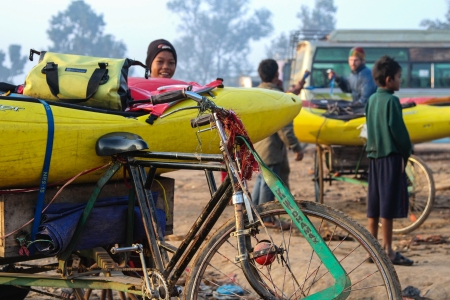
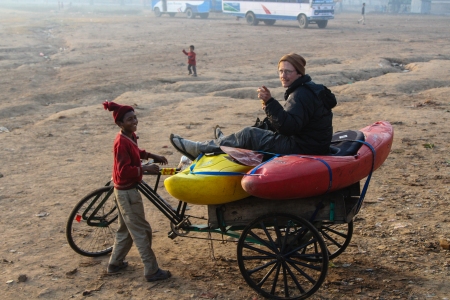
Four cam straps and various pieces of cheap, frayed nylon rope later we hesitantly climbed up on top of our “taxis” and began to roll, hurriedly down to the main road. We quickly realized that brakes were not included nor required equipment as we careened around pedestrians as our young drivers shouted and rung the little bells affixed to the handlebars.
As we came to the bottom of the hill, our speed slowed, and soon we were required to hop down from our perches and assist the boys in pushing ourselves up and over a small bridge and down a dirt track toward the airport.
A very confused guard stood at the other side of the gate at the entryway to the main terminal while we dug for our passports. He approved, handed us our “VIP” passes, and told us to leave our boats by the concrete steps. Other than the guard, the airport was abandoned at seven in the morning. We poked around looking for the ticket agent, until the guard came in and offered to call him and let him know we wanted to see him. Thus is the state of national flights in Nepal.
After a short while, our agent bustled in and hurried us into his office. Rifling through thick three-ringed-binders he put his finger on what appeared to be a random page, and looked up with a worried face.
“I’m sorry my friends, but there is no scheduled flight into Juphail until Thursday, and unless you can find five more people, that flight won’t depart either.” We all stared around blankly, half expecting this answer, and half-longing for the straightforward reliability of western air ticketing.
“Well even if we had five other people to fly on Thursday, where would our kayaks go? We know the plane is small,” Adam replied.
“Oh, well with the boats, you will need to charter. Kayaks are not allowed on scheduled flights,” he replied. We had been warned that this would be his tactic, and were prepared to argue with stories of past expeditions experiences through this same airport. He claimed everyone chartered flights and after vigorously poking at his calculator, claimed, “$450 each.”
We looked at each other and laughed. Back in Pokhara, we had been told that we need not pay more than $250 each including gear. The bartering fun began.
“That is too far over our budget my friend,” Adam replied, “we cannot pay that much.”
“Of course you can, you’re Americans! Your money goes much further here, I know you budget for these things on your trips.” His attempt at guilt-tripping us into siding with him met with eyes that were familiar with this game, and not interested in leaving more of our rupees than necessary.
“We’ll pay $200 each. Total. No extra charges for boats and luggage.”
“My friends, this is too little. Airplanes require airports, gas, and pilots. How are we supposed to pay for these things if you won’t pay the price of a ticket?”
“We are willing to pay the price of a ticket, but your price is too much. The ticket doesn’t cost more than $200, and the rest goes straight into your pocket.” He stammered at this, perhaps unaccustomed to being called out at his own game.
“Well perhaps, for you, we can make a deal.” He quickly punched a string of numbers into his oversized calculator which he then spun to show us, “$1,200 is the cost of the flight there and back, that means $300 for each of you.”
“But we’re not coming back on the plane. We go up, and kayak down. No plane back.”
“Well the plane still needs to come back, my friends, it cannot just stay there.”
“Well that’s your problem then isn’t it?”
“No, my friends, you charter a flight, you must pay for return too.”
“How about $800 for the flight total?” We tried back. I’m sure there are people in Juphail who will pay to come on the return flight, and you can charge them the extra money to reach $1,200.”
“That’s not how it works, my friends. The flight must be paid when it leaves. We’re on a tight schedule. The plane will arrive soon and needs to go somewhere else if you don’t want it. $1,200 is the cost. Will you pay?”
Tired of his attempts to force more money than necessary out of us, we told him we needed to discuss the matter with ourselves. The four of us stepped out of the cramped office and into the still empty, echoing terminal. Agreeing again that the most we could pay was $250, Jeff pulled out the plastic bag of oranges and passed them around. The small cup of tepid milk tea from the bus park was not quite cutting it, but it didn’t look like we were due for anything else to eat until we got to Juphail.
The ticket agent poked his head out the door, “my friends, the plane has landed. I need to know if you will take it to Juphail.”
“Okay, we’re coming.” Oranges were finished and we filed back into the office, feeling more and more like we were being hustled into a shady deal, than on a kayak expedition.
“We have an offer for you. It’s the highest we can pay, and know that it’s the same amount other westerners have paid for the same flight. $250 is our last offer.” We sat back apprehensively. That price brought the flight total to an even $1,000; more than adequate for fuel, pilots, and four pieces of oversize baggage.
“Let me think, my friends,” as his fingers rapped on the calculator keys. His face furrowed into what looked like an unhappy and bitter acceptance of truth. “Alright, we can get you to Juphail, but we must be fast, the plane needs to be somewhere else this afternoon.”
We breathed a quiet sigh of relief and pulled out our pre-counted wads of American bills. He counted, re-counted, then handed the stack to the guard to count again as he passed around a clip-board to collect our passport information and write out boarding passes. Paperwork and payment completed, and we were hustled into the departure area and asked to sign into a log book stating who we were and where we were headed. Under the “Reason for Travel” heading, we joined every other entry above ours that read “Kayak expedition” or “Kayaking Thuli Bheri.” The list extened at least three pages back into previous years, with only three or four parties per year.
A quick “security check” with another guard and our gear was readied for takeoff and loaded into the back of the small single engine plane sitting on the tarmac.
We climbed aboard and buckled ourselves into our seats, grins slowly creeping onto each of our faces as the realization that we were one step closer to actually putting on the river arrived. Take-off brought us views of expanding horizons cloaked in clouded valley-floors and growing snow-capped peaks. As we banked to the north, shimmering rivers twisted their way up ever-deepening drainages forking and splitting until the solid unbroken strands of aquamarine and turquoise were no more than thin ribbons of white.

Our flight brought us up and over a handful of lower passes each one clawing closer and closer to the belly of the plane, until we dropped down over the last one into what we then realized was the Thuli Bheri River valley and the tiny hillside village of Juphail.
The pilot brought us down level with the dirt strip that served as a runway, and as we sped closer, a downdraft dropped us below the front edge heading straight at the mountainside just beneath. A quick adjustment later and we were back above the barely level hard-packed surface.
Hearts racing and stomachs much higher in our throats than is normal, we disembarked from the plane into the morning dust. Boats were quickly unloaded, and to no surprise from our end, a handful of local villagers boarded the plane for the return trip. Even in one of the most remote regions in Nepal, news travels fast with the advent of cell phones.
As the plane taxied out to the end of the runway and revved up for takeoff, we set upon our pile of gear; re-organizing last minute food additions, water bottles, and other miscellaneous items. The rest of the day would prove a struggle to find the best way to carry a boat loaded with 5 days of food and gear on the front edge of winter in the Himalaya.
Easily weighing in at more than 100 pounds, it appeared that the best method was on end using the seat-back as a tump-line over our foreheads. Unaccustomed to that much weight on our heads however, we each soon encountered head, neck, and back aches beyond what had formerly been deemed possible. Winding our way down from the airport, we encountered a small village, and after unsuccessfully searching for porters, we continued on our way.

The guidebook claimed an hour and a half hike from the airstrip to the river. Setting a tone for the rest of the trip, it took us almost double that time. The sun had already dropped below the ridge above us by the time we made it to the river, and gave the afternoon a distinct early winter chill. We dropped boats at a small hut and hoped for a passing tractor or jeep to help us get the rest of the way to Dunai before dark. Two cups of tea later, and still no tractor or jeep, we donned life jackets, and proceeded to drag our fully loaded boats the five kilometers up to Dunai arriving just as darkness crept into the medieval-feeling town.
Everything we had read suggested that we find the Blue Sheep Hotel and base out of there for the next few days. By the time we had changed out of our cold sweaty t-shirts and into long underwear and down jackets, town had virtually shut down. Due to the regions relatively recent opening to westerners, Dolpa is very undeveloped compared to the rest of the country. If you’re looking for the Nepal that’s storied about with dirt tracks, porters, and very culturally rich villages, Dolpa is it. No cell service once you pass Juphail, no vehicles past Dunai, and an extremely rugged landscape devoid of the usual trappings of tourists and trekkers. English is definitely not spoken here.
As we wandered around the main street in the dark, doing our best to avoid piles of donkey manure, we managed to find one little shop with it’s single light bulb still on and the family inside agreed to make us dal bhat. Between stuffing handfuls of rice, lentils, and potatoes in our mouths we created a plan for the next day; find porters, start hiking as early as possible, don’t stop until we get to Tarakot, sleep.

